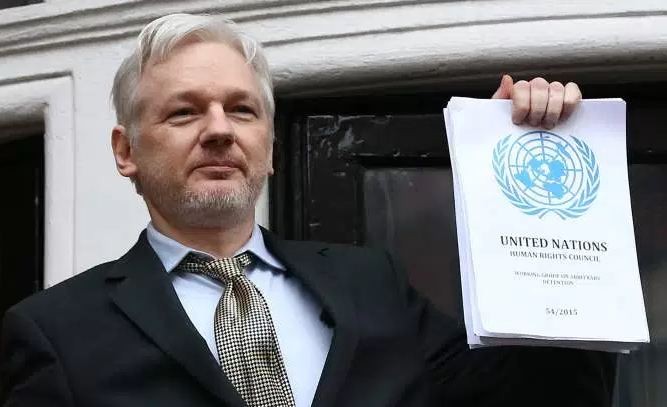Fugitive WikiLeaks founder Julian Assange currently hiding at the Ecuadorean Embassy in London might have just six months left of asylum before his hosts decide to hand him over to the British government.
Assange's protector, Ecuador's leftist president Rafael Correa, steps down as president in February 2017 and while polls in that country suggest his hand-picked successor, Lenin Moreno, will win the upcoming elections, there is no guarantee Moreno will continue Assange's asylum. The fugitive Assange is wanted on charges of rape by both Sweden and the United Kingdom.
What is writing finis to Assange's saga that began in 2012 when Correa in a fit of anti-American pique granted Assange asylum are the steadily warming ties between the economically distraught Ecuador and the United States.
With Ecuador's economy in shambles because of low oil prices, the country's next president is widely expected to turn to the International Monetary Fund (IMF) for financial aid, and the U.S. is the fund's largest shareholder. The U.S. is also Ecuador's top trading partner despite Correa's anti-U.S. rhetoric.
The terrifying writing on the wall for Assange made itself manifest two days ago when Ecuador cut-off his internet connection, rendering him unable to do his work of releasing damaging emails stolen by his allies, including the Russian government.
Analysts noted most of the confidential data released by WikiLeaks have been anti-American. WikiLeaks has never released any stolen emails damaging to Russia or its megalomaniacal president, Vladimir Putin.
Ecuador admitted to severing Assange's internet access on Oct. 18 to prevent him from meddling in the U.S. election. This action came after WikiLeaks published documents and messages hacked from the presidential campaign of former U.S. Secretary of State Hillary Clinton, who will become U.S. President after winning the election on Nov. 8.
"The government of Ecuador respects the principle of nonintervention in the affairs of other countries, does not interfere in current elections, nor does it support any candidate in particular," said a statement by the Ecuadoran Foreign Ministry.
The emails WikiLeaks disclosed suggest Clinton's campaign worked to discredit a woman who accused her husband, former President Bill Clinton, of rape.
WikiLeaks accused Department of State Secretary John Kerry of personally petitioning Ecuador to cut Assange's internet access. Officials in Washington have rejected the charge and deny that Kerry was involved in any way.
Political analysts say that Ecuador's continuing to tolerate Assange revealing stolen emails from their London embassy risks putting Ecuador on Russia's side of an increasingly vicious cyberwar with the United States.
"Before, the costs for Ecuador of hosting Assange were minor," said Santiago Basabe, a political analyst at the Latin American School of Social Sciences in Quito. "But they are growing bigger now because they involve questions of U.S. national security, its tense relations with Russia and the presidential elections."



























